We work closely with our members and partners to de-carbonise the built environment. From thought leadership, to our involvement in the global effort to eliminate carbon emissions, we believe Australia’s built environment is making good progress toward our carbon positive goals.
Climate Positive Partners
We thank our partners for their leadership and support of our activities and are always looking for organisations seeking to demonstrate their leadership in this space.
For more information on becoming a Carbon Positive Partner please contact us.
Climate Positive partners


A Climate Positive Roadmap for the built environment
Our Climate Positive Roadmaps establish the steps required for the built environment to decarbonise new and existing buildings and precincts.
Developed in close consultation with industry and government, the roadmaps plot a world-leading path to ensure we can achieve our goals by 2050.
Climate positive roadmap for precincts
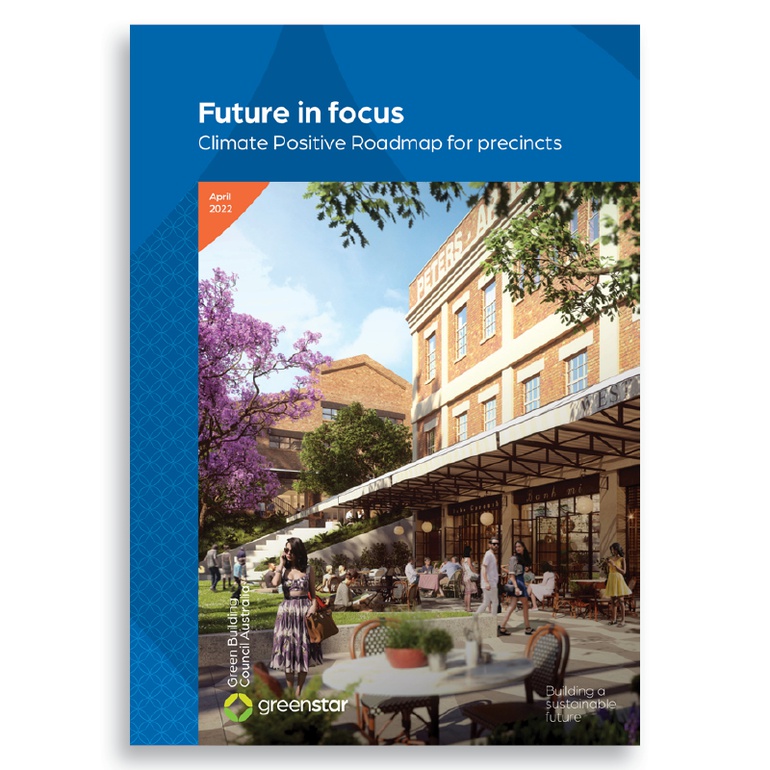
Urban development sets the scene for carbon impacts for generations. Early decisions impact long-term transport, buildings, water, and waste infrastructure emissions. Precinct developments create exciting opportunities for carbon reductions by linking together planning, urban design, buildings, transport, and infrastructure.
The Climate Positive Roadmap for precincts contains a set of principles to guide precinct carbon reductions and ambitious targets for all new precincts to be climate positive by 2030 and existing precincts by 2050.
It spells out the five key actions needed to facilitate changes in the way we plan, design, and deliver our precincts – and importantly identifies the various stakeholders that can play a role in delivering those changes.
Whether you are a developer, investor, planner, precinct operator, materials supplier, or policymaker, this roadmap will help you lead in the delivery of a decarbonised built environment.
We celebrate early leaders in precinct carbon reduction with the following case studies:
Download the roadmapA Climate Positive Roadmap for the built environment
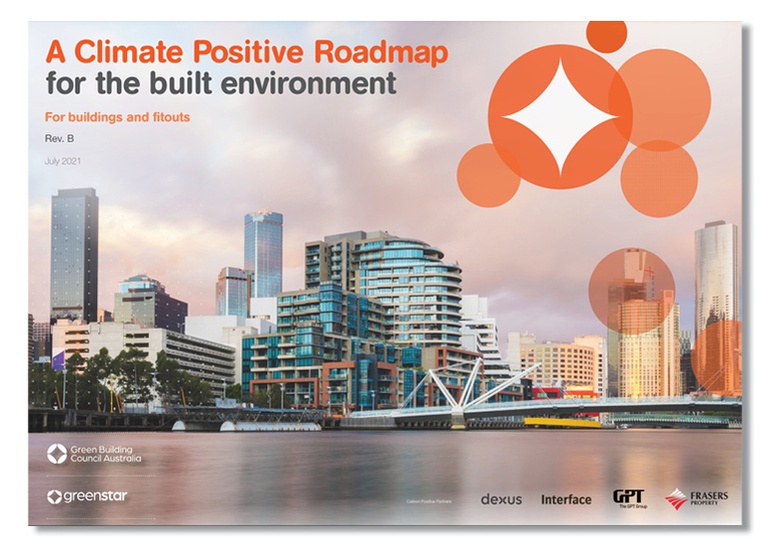
'A Climate Positive Roadmap for the Built Environment' establishes the steps required for new and existing buildings and fitouts to decarbonise.
The roadmap clearly outlines the high-level outcomes, actions, targets and policy positions required. These are proposed alongside changes to Green Building Council of Australia's (GBCA) Green Star rating tool to ensure it helps lead industry through the next decade of transformation.
Developed in close consultation with industry and government, the roadmap plots a world-leading path to raise the benchmark for sustainable design, construction and building operation in Australia’s built environment.
Webinar: An overview of our Carbon Positive Roadmap
Read our media release
Download the paperAdditional information
To assist in the development of this document, we commissioned a report on the cost and feasibility of implementing draft recommendations of an early version of the Roadmap. We thank AECOM for their assistance.
While the report was developed for the draft version of the roadmap, and does not reflect the current targets, it continues to hold valuable insights for industry.
The report and subsequent recommendations can be found here.
Previous versions of the Climate Positive Roadmap for the built environment
Prior to this release, on 6 March 2017, GBCA launched its first discussion paper on this topic. The discussion paper set the scene for the engagement that occurred over the year, outlined potential priorities for the industry and asked for feedback.
A draft of the roadmap was released in June 2018. The draft sought feedback on the initial roadmap targets. This document has now been superseded by the most current version (Rev.A).
These three documents are presented for information purposes only.
Climate Positive Buildings and our Net Zero Ambitions
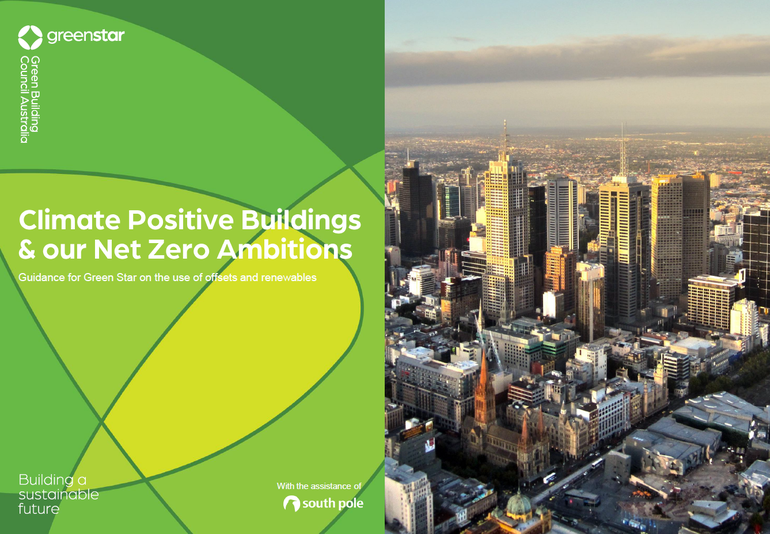
This document builds on our Climate Positive Roadmaps to articulate a clear strategy that all buildings should follow. It also sets global and leadership targets that should be adopted and exceeded by every stakeholder in the built environment.
The document explains the why and how we need to drive our emissions to zero and what actions are available to us. It also explains how the built environment needs to act, to lead on the ambitions noted in the Paris Agreement, and the role and targets set in Green Star.
It also provides useful background and context to the role of renewable energy and offsets in our net zero ambitions, and guidance on how to make claims for renewables and offsets within Green Star projects.
Updated 25/11/2021
Download the documentClimate Positive Pathway for existing buildings
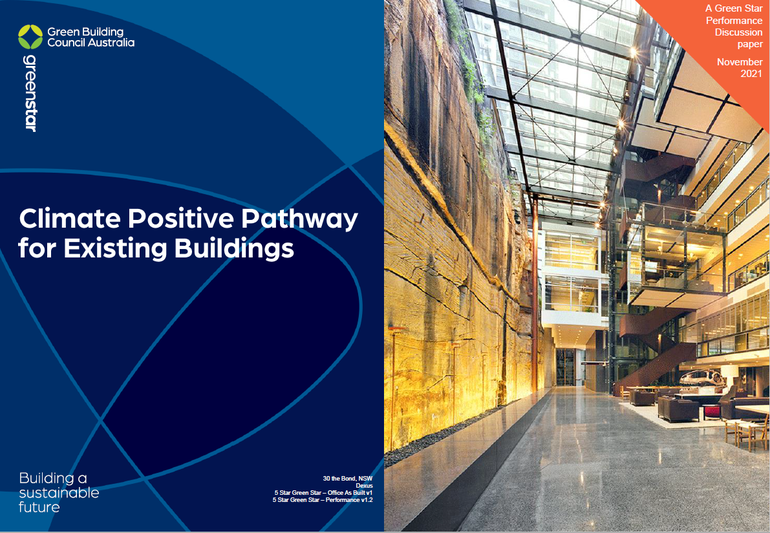
A Green Star Performance Discussion Paper
This paper sets out the actions and target dates for the decarbonisation of existing buildings through the Future Focus Green Star Performance rating tool, following on from consultation held in late 2020.
Existing buildings are the largest share of emissions in the built environment. Most of those emissions come from energy use (electricity, gas, and diesel), with other emissions occurring from embodied carbon in part due to maintenance and refurbishment as well as emissions from water and waste. Existing buildings can decarbonise, but this takes time. Over the next 30 years, millions of buildings will need to become more energy efficient, swap out equipment for one that doesn’t use fossil fuels, while at the same time ensuring a high level of comfort to the occupants.
The Climate Positive Pathway aims to encourage more aggressive emission reduction targets in line with the expectations arising from recent science and analysis, to drive transformation of existing buildings earlier than expected through the use of Green Star Performance. The pathway provides clear pathways and definitions for action by existing buildings, setting targets for action for existing buildings over a 20-30 year time horizon.
Download the documentThe carbon thought leadership series
Measuring impact: why Scope 3 deserves our attention more than ever
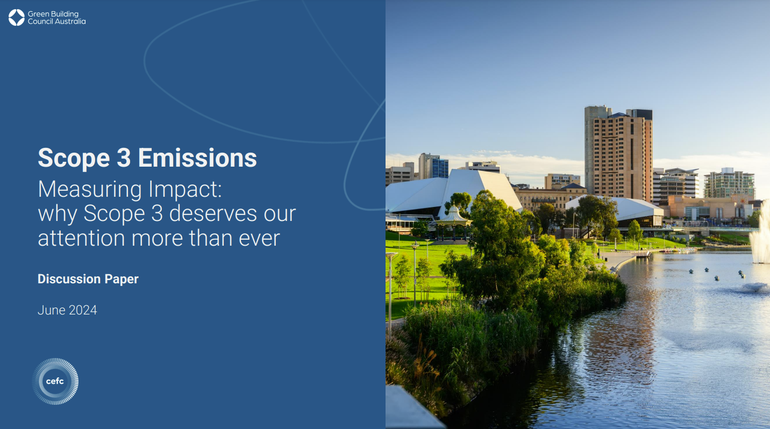
This discussion paper:
- Reviews the various scope 3 emissions frameworks and standards currently available, and assesses how they apply to financial reporting
- Demonstrates how project-level analysis can be translated and applied to financial reporting
- Provides a common interpretation and approach to scope 3 categories relevant to the real estate sector, as well as an interpretation of minimum boundaries, to help companies understand which activities should be accounted for in their scope 3 reporting
GBCA is seeking contribution to the discussion about reporting on scope 3 emissions for the real estate sector. Feedback on this discussion paper will result in a guidance document being developed in 2025 for reporting scope 3 emissions in the Australian real estate sector.
Download the paper Provide feedbackA practical guide to upfront carbon reductions
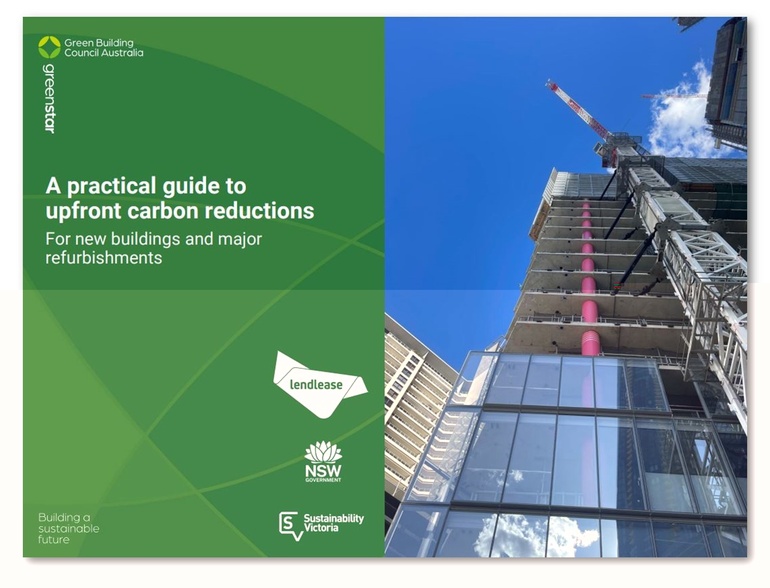
This guide provides information on reducing upfront carbon emissions in new buildings and major refurbishments. The guide outlines steps to be taken during the design and construction process and offers solutions for common challenges. It is intended to be used alongside a calculation guide that was released in December 2022.
Download the paperCarbon offsets, Last but not later
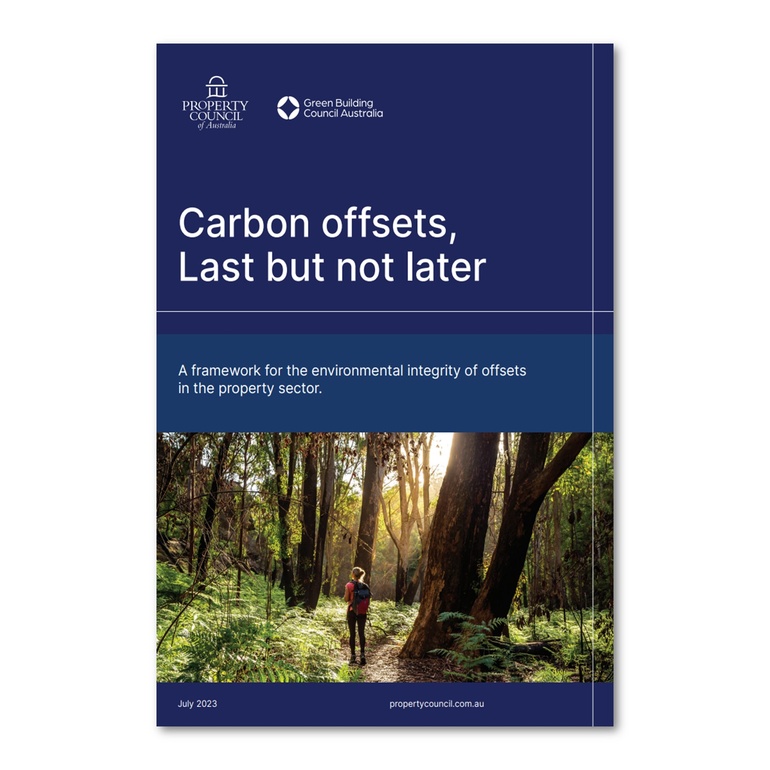
This framework recommends four related strategies to ensure environmental integrity of an offset program that delivers reliable and durable emission removal, mitigates the risk of greenwash challenges and avoids reputational damage.Four key components:
- Demonstrate the role of offsets in a science aligned net zero plan
- Document the offset strategy
- Show how a program of due diligence ensures offsets meet the quality criteria in the offset strategy
- Maintain a Natural Capital Balance sheet; a register of offsets maintained over time recording the results of ongoing stewardship checks and measurements of stored carbon
Embodied Carbon and Embodied Energy in Australia's Buildings
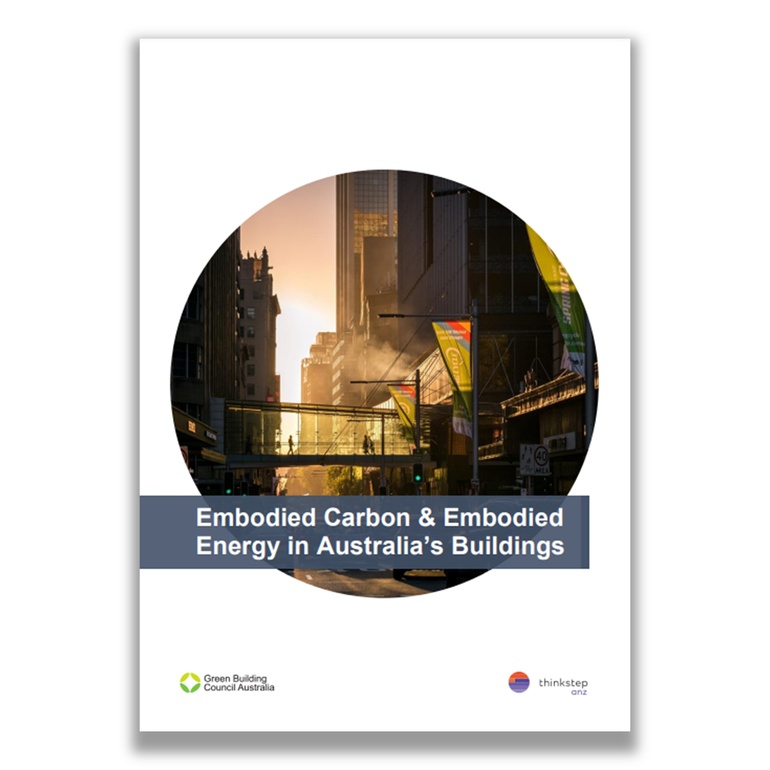
The purpose of this report is to calculate the embodied carbon and embodied energy in Australia’s buildings. This report compares the 2019 baseline year to a 2050 business-as-usual scenario to show what could happen without deliberate action on embodied emissions.
Download the documentThe carbon leader series
Watch our carbon leaders series to learn how Lendlease, Dexus, GPT Group and Frasers Property Australia are leading the way to a carbon positive future.
Global Commitment for Net Zero Carbon Buildings
The Global Net Zero Carbon Buildings Commitment challenges businesses and organisations across the world to take advanced climate action by setting ambitious targets to eliminate operational carbon emissions from their building portfolios by 2030 in order to meet the Paris Agreement ambition of below 2 degrees of global warming. It was launched by WorldGBC and the We Mean Business Coalition at the Global Climate Action Summit in September 2018. We are proud to be part of the working group that develops and manages the Commitment.
Want to join?
This is your chance to showcase your leadership and join the global movement to decarbonise the built environment.
For companies that operate in Australia, we have developed a fact sheet to assist you in navigating the commitment and detail how Green Star will ensure your success.
World Green Building Council's Advancing Net Zero Program
Advancing Net Zero is WorldGBC’s global project which aims to promote and support the acceleration of net zero carbon buildings to 100% by 2050. GBCA is a founding member of the Advancing Net Zero Program.
We are proud to have been involved in the release of the groundbreaking reports
- From Thousands to Billions - Coordinated Action towards 100% Net Zero Carbon Buildings By 2050, which outlines how net zero goals can be achieved through concerted action of three core groups of actors: Business, Government and Non-Governmental Organisations. In addition to the document above, WorldGBC has created a set of snapshots detailing each green building council's response to the cause of Advancing Net Zero. The snapshot detailing our activities can be found here.
- Bringing Embodied Carbon Upfront is a report calling for urgent and co-ordinated action to tackle global embodied carbon emissions from the building and construction sector.
In addition, WorldGBC has created a set of snapshots detailing each green building council's response to the cause of Advancing Net Zero. The snapshot detailing our activities can be found here.
Carbon and climate definitions
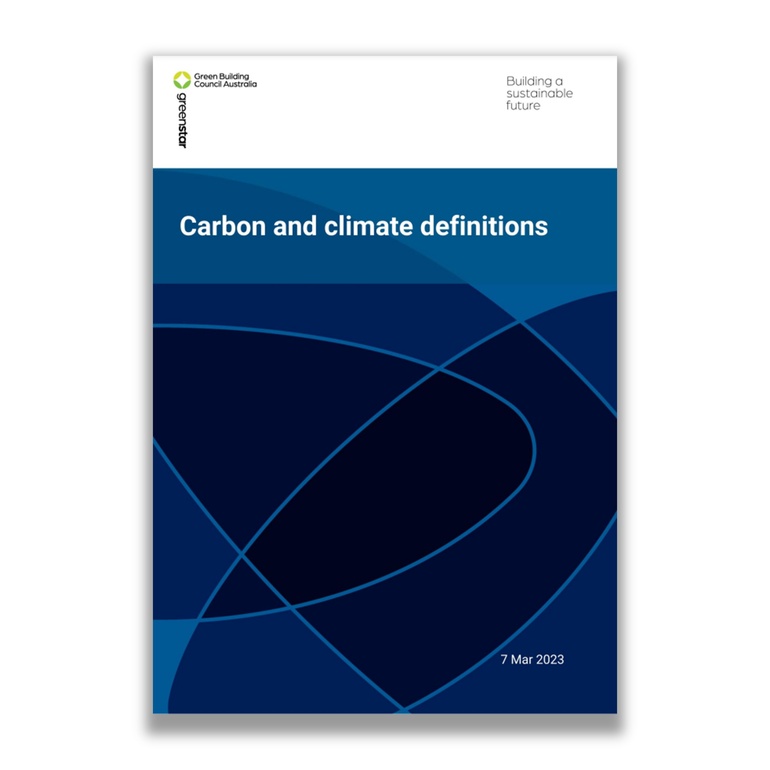
The language we use about tracking, measuring and reporting on carbon and climate goals can be confusing, but it doesn’t need to be. We’ve created a list of climate and carbon definitions relating to buildings to help demystify and clarify commonly used words and terms. We hope this list helps industry develop a shared, consistent language so we’re all on the same page.
Download the document